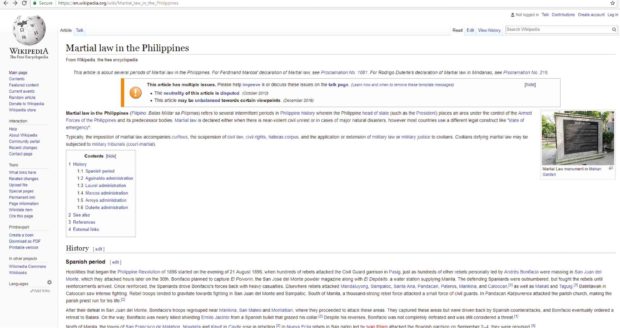The battle for truth on Wikipedia

OPEN SOURCE The Wikipedia page on martial law
Whether on the streets, in cyberspace or in the academe, individuals and groups have emerged to fight the war for truth, especially on the narratives about the late dictator Ferdinand Marcos and his martial law regime.
Late last year, Wikipedia, the internet’s most popular and biggest reference source that is also known for being open to edits, became a battleground between people who wanted to tailor-fit martial law’s history to their own ends, and those who would counter such revisionist interpretations.
According to The Guardian, the Ferdinand Marcos Wikipedia page has been edited an average of 300 times a year over the last decade. But the revisions increased from 375 in 2015, to 1,328 in 2016.
In particular, the Wikipedia page on martial law in the Philippines showed a spike in edits last year. From 13 edits recorded during the whole year in 2015, the changes soared to 107 for the month of November 2016 alone.
The jump in the number of edits on the page happened at about the same time when Marcos was given a controversial hero’s burial. On Nov. 18 last year, in a secrecy-shrouded ceremony that stunned the country, Marcos was buried at Libingan ng mga Bayani in Taguig with military honors.
Article continues after this advertisementThe Supreme Court had previously voted 9-5 to allow the burial, with the petitioners given 15 days to appeal the decision. But on the 10th day after the ruling was issued, the Marcos family hastily buried its patriarch.
Article continues after this advertisementAmong the most common revisions by Marcos apologists on Wikipedia are references to the family’s ill-gotten wealth and his disputed trove of war medals. Burnishing the Marcos’ name seems to be part of the family’s plan to make a political comeback, a strategy that saw Marcos’ son and namesake, Bongbong Marcos, just over 200,000 votes short of winning the vice presidency in the 2016 election.
Open source
As an open source platform, Wikipedia has often been cited as unreliable as it is vulnerable to changes and edits by people who may choose to remain anonymous and, thus, cannot be held accountable nor challenged as to the accuracy of their revisions.
But attempts to distort the truth on Wikipedia pages have been countered by so-called Wikipedia Warriors.
In a story published in August, The Guardian wrote about computer programmer Carlos Nazareno, who would spend hours cleaning up Wikipedia pages, correcting historical revisionism and supporting his edits with sources, despite the strong likelihood that his corrections would be deleted by another user in one go.
What keeps Nazareno and the other Wiki Warriors determined to weed out fake information is the thought that the internet, Wikipedia’s home, has become such a powerful and accessible tool that it can decide elections and shape a nation’s future. Millennials, who have no direct experience about martial law, depend mainly on the net’s various platforms— YouTube videos, Facebook posts and memes, Twitter and Wikipedia—for data they can mine and use.
Facebook has been used as well by students, among them are Ignacio Lorenzo Villareal and Ronin Leviste of Xavier School in San Juan City, to organize rallies to protest the Marcos burial. Teachers from different schools and universities have also used Facebook to post short videos of professors from different fields discussing the impact of martial law on agriculture, national minorities and labor policy, among others.
“We wanted to debunk the myths circulating about the Marcos regime,” said history professor Michael Pante of Ateneo de Manila.
Source: Inquirer Archives, The Guardian